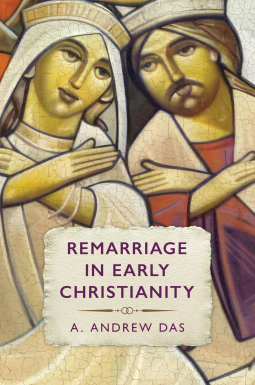
Remarriage in Early Christianity
by A. Andrew Das
This title was previously available on NetGalley and is now archived.
Buy on Amazon
Buy on BN.com
Buy on Bookshop.org
*This page contains affiliate links, so we may earn a small commission when you make a purchase through links on our site at no additional cost to you.
Send NetGalley books directly to your Kindle or Kindle app
1
To read on a Kindle or Kindle app, please add kindle@netgalley.com as an approved email address to receive files in your Amazon account. Click here for step-by-step instructions.
2
Also find your Kindle email address within your Amazon account, and enter it here.
Pub Date Jun 27 2024 | Archive Date Jun 21 2024
Eerdmans Academic | Eerdmans
Talking about this book? Use #RemarriageinEarlyChristianity #NetGalley. More hashtag tips!
Description
What did early Christians believe about remarriage after divorce?
The New Testament sends mixed messages about divorce. Jesus forbids it in Mark’s and Luke’s Gospels, but he seems to make an exception for victims of infidelity in Matthew’s Gospel. Paul permits divorce in 1 Corinthians when an unbeliever initiates it. Yet other Pauline passages imply that remarriage after divorce constitutes adultery.
A. Andrew Das confronts this dissonance in Remarriage in Early Christianity. Challenging scholarly consensus, Das argues that early Christians did not approve of remarriage after divorce. His argument—covering contemporary Jewish and Greco-Roman contexts, the Gospels, Paul’s letters, and ante-Nicene interpretation—reveals greater consistency in early Christianity than is often assumed. Das pays special attention to the Greek words used in contemporary bills of divorce and in the New Testament, offering much-needed clarity on hotly contested concepts like porneia.
At once sensitive and objective, Das finds an exegetically sound answer to the question of remarriage among early Christians. This bold study will challenge scholars and enlighten any Christian concerned with what Scripture has to say on this perennially relevant topic.
The New Testament sends mixed messages about divorce. Jesus forbids it in Mark’s and Luke’s Gospels, but he seems to make an exception for victims of infidelity in Matthew’s Gospel. Paul permits divorce in 1 Corinthians when an unbeliever initiates it. Yet other Pauline passages imply that remarriage after divorce constitutes adultery.
A. Andrew Das confronts this dissonance in Remarriage in Early Christianity. Challenging scholarly consensus, Das argues that early Christians did not approve of remarriage after divorce. His argument—covering contemporary Jewish and Greco-Roman contexts, the Gospels, Paul’s letters, and ante-Nicene interpretation—reveals greater consistency in early Christianity than is often assumed. Das pays special attention to the Greek words used in contemporary bills of divorce and in the New Testament, offering much-needed clarity on hotly contested concepts like porneia.
At once sensitive and objective, Das finds an exegetically sound answer to the question of remarriage among early Christians. This bold study will challenge scholars and enlighten any Christian concerned with what Scripture has to say on this perennially relevant topic.
Available Editions
| EDITION | Ebook |
| ISBN | 9781467467513 |
| PRICE | $44.99 (USD) |
| PAGES | 384 |
Available on NetGalley
NetGalley Shelf App (PDF)
Send to Kindle (PDF)
Download (PDF)



